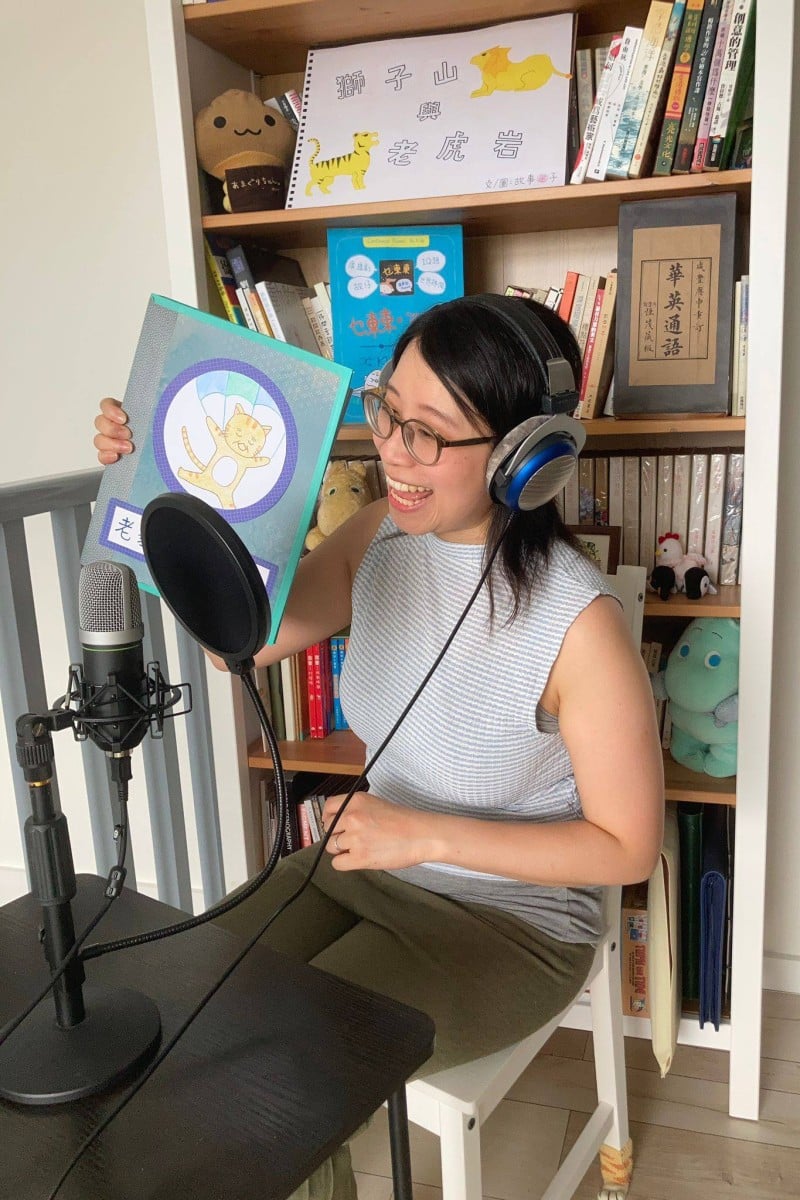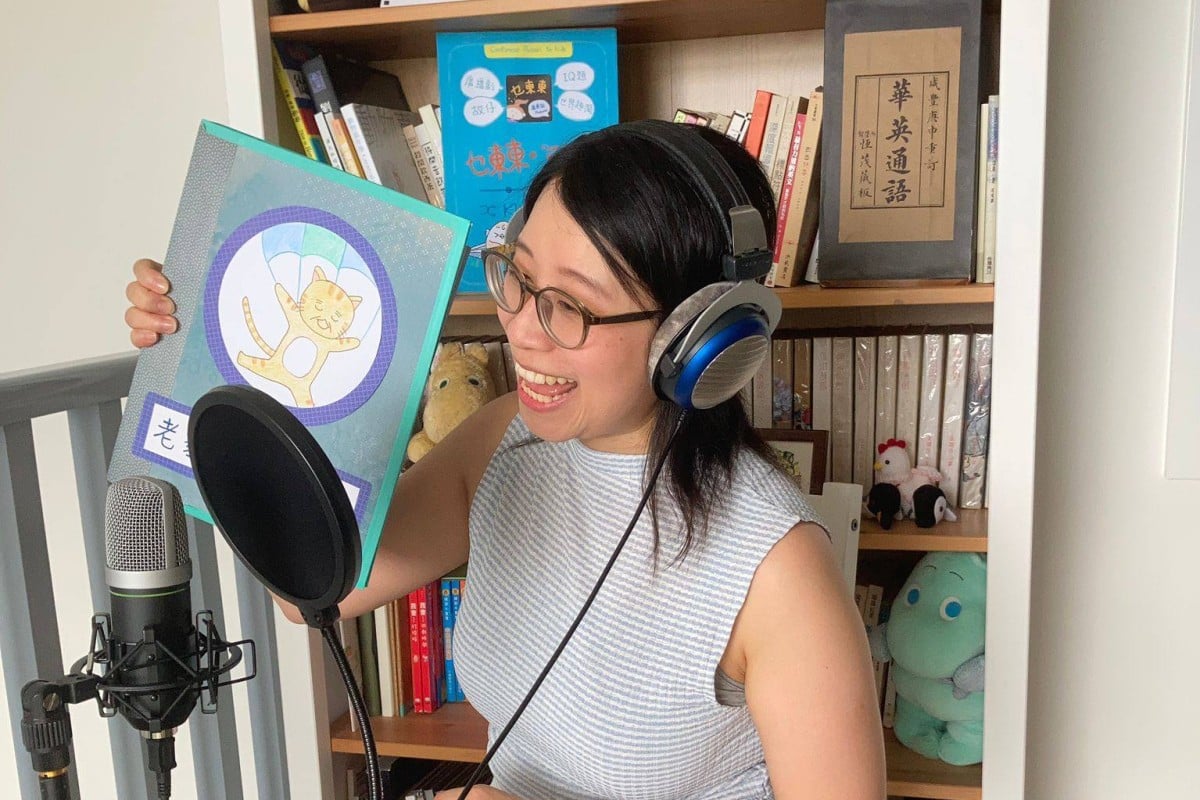
Cantonese podcast helps immigrant kids from Hong Kong tune in to their roots
Muggle Tango Tingo uses slang, riddles and original stories to help children build Cantonese proficiency and learn about Hong Kong culture.
 Suie, who prefers not to use her full name, is the creator of Muggle Tango Tingo, a biweekly podcast designed to help older children maintain their Cantonese. Photo: Handout
Suie, who prefers not to use her full name, is the creator of Muggle Tango Tingo, a biweekly podcast designed to help older children maintain their Cantonese. Photo: Handout
Every week, Talking Points gives you a worksheet to practise your reading comprehension with exercises about the story we’ve written
Can you imagine the God of Wealth apprenticing for Santa Claus at the North Pole – or Santa, clad in a Tang suit, giving out blessings during Lunar New Year?
This whimsical premise forms the heart of a Cantonese podcast created by Suie, who asked not to share her full name. Inspired by a viral meme featuring the unlikely duo, Suie transformed the idea into a Cantonese short story for children.
“Combining these two iconic figures into a story not only captures the humour of the meme but also highlights the beauty of East and West coming together,” explained the 37-year-old, affectionately known by her nickname, Story Swallow.
“Growing up in Hong Kong, I was immersed in a mix of Chinese and Western traditions ... But after moving to Australia, I realised just how special and valuable this cultural blend is.”
Last April, she launched Muggle Tango Tingo, a biweekly podcast designed for children aged six to 12. Each episode weaves together Cantonese slang, riddles, original stories and world trivia, aiming to entertain while preserving the language.
Before moving to Melbourne in 2022, Suie spent over a decade producing children’s theatre in Hong Kong. She now lives abroad, but her passion for storytelling remains unchanged.
“I wanted to create something fun and engaging to help kids maintain their Cantonese,” she said.
“Can children living abroad still find joy in Cantonese programmes that are made just for them?”
Cantonese for immigrant children
Like many immigrants, Suie has been actively preserving her cultural heritage after relocating, for example, by volunteering to tell Cantonese stories to children.
But Suie noticed a troubling pattern: many immigrant children were losing their grasp of Cantonese.
“When children are less exposed to Cantonese or Chinese, their primary way of understanding the world shifts to English,” she said.
“At first, they still use Cantonese for simple daily conversations with family. But when it comes to expressing emotions ... or discussing complex ideas, they instinctively switch to English.”
The creator pointed out a common misconception among immigrant parents: many believe that if their children lived in Hong Kong until secondary school before relocating, they would not need additional support for their Cantonese. But according to Suie, their proficiency can erode without continued, meaningful engagement.
“There are more engaging ways to help children maintain their Cantonese, beyond the traditional Chinese or Cantonese classes,” she added.
Hong Kong immigrant mums’ Cantonese books teach kids their mother tongue
In her search for relevant resources, Suie discovered a glaring gap. Most materials cater to children under six, yet the sharpest decline in language proficiency often occurs after this age. Few resources address the needs of older children. That is where her podcast comes in.
With help from volunteers around the world who help with subtitles or audio narration, Suie balances this project with her part-time work in the performing arts.
“My goal is to create a dynamic show featuring a variety of Cantonese voices, so children can connect with the language in a way that feels both familiar and enriching,” she said.
Suie also caters to her audience’s interests. For instance, she is working on an episode about trains and has invited young listeners to share their favourite train stations and record themselves reading station announcements, as if they are on a virtual railway.
“That’s why I created this podcast, as a platform to ... create a global Cantonese community,” she said.
Sharing Hong Kong culture
Beyond connecting Cantonese-speaking children worldwide, Suie is also on a mission to spotlight fading Hong Kong traditions through her podcast.
“It’s about raising awareness. Once people know about these cultural elements, they can decide ... whether they’re irrelevant or worth preserving,” she said.
Her coming Lunar New Year episode will explore the Chinese almanac, or tong sheng, a guide based on ancient beliefs offering advice for auspicious days.
“Fewer people from this generation use it or even know much about it,” she explained. “So what role does this cultural symbol play in modern society? When it’s no longer practical, can it evolve into something new?”
Another topic on her radar is Cheung Chau’s Floating Colour Parade, in which children are dressed as famous figures from history or folklore and are placed on supports to make it look like they are floating.
“My parents’ generation grew up in Cheung Chau, so I have a personal connection to the island’s seafaring community,” she said.
“I also want to tie this story back to the experiences of immigrant families, showing how traditions can adapt and travel with us.”
To test your understanding of this story, download our printable worksheet or answer the questions in the quiz below.
